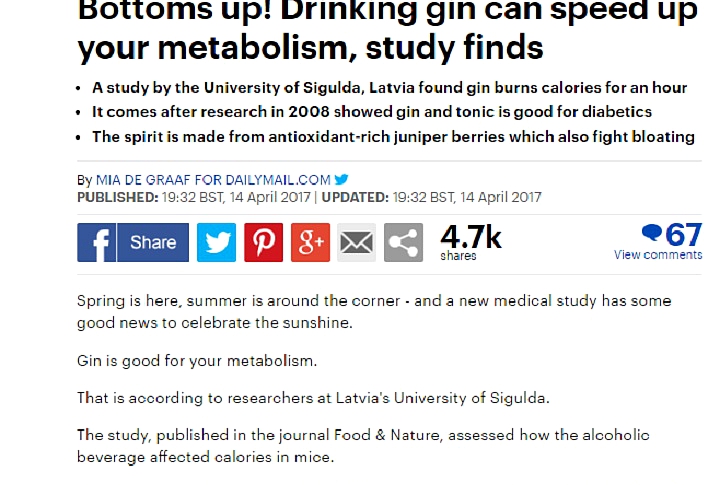In a report April 14 headlined "Bottoms up! Drinking gin can speed up your metabolism, study finds" carrying the byline of one Mia De Graaf, the Daily Mail reports:
"Gin is good for your metabolism... That is according to researchers at Latvia's University of Sigulda."
The university is also cited in an accompanying picture of what looks very much like a refreshing gin and tonic.
There's only one problem: the University of Sigulda does not exist.
Sigulda, better known for its bobsled track and autumn walking trails, does have a branch of the Latvian Agricultural University, but there is no 'University of Sigulda'.
The newspaper says the claim is made in a study published in journal Food & Nature which does not appear to exist either, if the advanced journalistic research tool known as Google is to be believed.
Quoted is "lead author" Professor Thisa Lye, a name that doesn't sound the least bit Latvian but does sound like an incredibly clumsy pun that nevertheless failed to arouse the journalistic suspicions of the Mail's newshounds.
Some way down the story the Mail's ace reporter reveals the actual source of the story to be "Yahoo", suggesting that the whole thing is actually just a lazy pick-up of a not particularly amusing April Fool story from two weeks previously.
Sure enough the Yahoo story in question is dated April 1, with the source apparently 'Prima' magazine. Anyone with the steely newsgathering determination to click on the appropriately-named Prima source would see an admission that the whole thing is an April Fool's day prank written by Francesca Rice.
But in a nice demonstration of the circularity of news and the fact that witless credulity is a global phenomenon, Yahoo's Indian operation is now reporting the Mail's story as fact.
Numerous other news sources around the world have followed suit.
"Of course, more peer-reviewed research on humans is needed to substantiate the claim," says My Domaine, assuming an air of gravity on April 11 that is sadly not matched by its own attempts at fact-checking.
The story even reached as far as New Zealand, with clinical details of gin-swilling mice at the University of Sigulda and their 17% metabolic boosts outlined.
The net result appears to be that people around the world are being told to drink gin for its health benefits based on a fictitious study from a non-existent university. What could possibly go wrong? Ask William Hogarth in his classic engraving 'Gin Lane' as explained by none other than the Daily Mail.
Perhaps the University of Sigulda could be commissioned to carry out some research into fake news and how it is spread? This would make an excellent case study and Professor Thisa Lye is probably willing to lead the effort if anyone can get her out of the university bar where she is currently knocking back martinis.





























